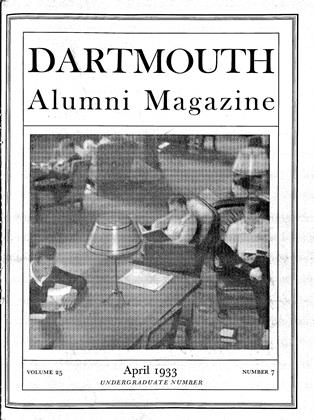By Ernest R. Groves '03, Henry Holt & Co., N. Y., 1933.
There is no human relationship which suffers more from lack of needed information than does that of marriage. Not only is the subject of marriage surrounded by traditional and arbitrary taboos but there is also a natural reticence felt with regard to a frank facing of the deeper problems of personal adjustment in marriage. Thus there are quite understandable obstacles and handicaps placed in the way of students and educators who may wish to make the justifiable attempt to apply present-day science to marriage problems or to deal with domestic experience scientifically.
Professor Groves has had the courage of a pioneer in writing this timely book whose pioneering character has made the author fully cognizant of the dangers that have beset his pathway. The author has been entirely successful in the difficult task of writing a text book which may be of direct practical value to college youth, both in preparation for successful marriage and in meeting problems as they arise in matrimonial adjustment, without making the mistake of being partisan in his treatment of controversial matters such as birth control, divorce, etc., or of yielding to the temptation of placing any stress on morbid experience.
It is the opinion of the author that it is apparent that a definite responsibility for the developing of preparation for marriage rests upon the colleges. He claims that the time has come when no institution of higher learning can fully meet its social obligations without including education for marriage. That there is real truth in this claim is attested by the fact that such college courses on marriage are originating at the request of the students themselves. President Chase of the University of North Carolina acceded to such a student request at that institution eight years ago. His interpretation of the meaning of adequate education for modern life agreed entirely with the expressed wishes of the students. It is interesting to note, too, that students at Dartmouth are requesting that the College fill this gap in the education of Dartmouth men. A representative of The Dartmouth recently has been approaching faculty members on this subject. Whatevermerits or dangers there may be in giving such a college course on marriage, Professor Groves nevertheless is of the firm opinion that "nature has given us no choice and there is no possible barrier to sex interest which any educational organization can erect for the shelter of its youth. The policy that attempts this is incompatible with the prevailing conditions of modern life and merely means surrendering the opportunity for constructive wholesome instruction, leaving the young man and woman to draw information from those who, however sophisticated and confident, are fundamentally as ignorant as their pupils. It is folly to attempt adequately to train young people for life adjustment while offering them no opportunity to gain insight into the meaning of the domestic experience upon which they stake so much of their happiness."
The author realizes that sex cannot be ignored in such a discussion without receiving the contempt of college youth, both men and women. In his book he does not, however, commit the error of judgment that would conceive domestic adjustment as merely sex adjustment. He realizes full well, too, that there is no science of marriage and that there is not likely to be one in the sense that we have a science of man's body, physiology. His thought would appear to be sound, however, when he says that "although there is no science of marriage equal to the prescribing of exact rules for matrimonial success, it does not follow that science has nothing of value for the newly married or for those under domestic strain. The fact that successful marriage requires mutual understanding, insight in dealing with exacting problems, and often escape from the habits of concealing feeling, the result of previous taboo, makes all the more valuable the assistance that science is prepared to give."
The advice and information contained in this invaluable book are never trite; they are the fruit of the life experiences of many men and women. The discussion of the book is clarified by reference to pertinent case material which enhances the volue of the work. Professor Groves has written other books on home, marriage and related subjects. His Marriage will richly deserve the assured appreciation of a large interested public. There is no other commonsense book available today that fulfils so adequately a long-felt need as does this particular book. It is unquestionably Professor Groves' best work to date.
 View Full Issue
View Full Issue
More From This Issue
-
 Article
ArticleDARTMOUTH MEN IN AVIATION
April 1933 By Carroll A. Boynton '33 -
 Class Notes
Class NotesClass of 1910
April 1933 By Harold P. Hinman -
 Article
ArticleHANOVER BROWSING
April 1933 By Rees Higgs Bowen -
 Article
ArticleNorthern April PART ONE
April 1933 -
 Class Notes
Class NotesClass of 1902
April 1933 By Hermon W. Farwell -
 Article
ArticleTHE UNDERGRADUATE CHAIR
April 1933 By J. S. Monacan'33.
Ralph P. Holben
-
 Books
BooksSocial Problems and Education
March, 1926 By Ralph P. Holben -
 Books
BooksThe Drifting Home,
FEBRUARY, 1927 By Ralph P. Holben -
 Books
BooksWholesome Marriage.
FEBRUARY, 1928 By Ralph P. Holben -
 Books
BooksOUTDOOR RECREATION LEGISLATION AND ITS EFFECTIVENESS
JUNE 1930 By Ralph P. Holben -
 Books
BooksTHE TRIAL OF BRUNO RICHARD HAUPTMANN
March 1938 By Ralph P. Holben -
 Books
BooksSOCIETY AND CULTURE.
February 1962 By RALPH P. HOLBEN








